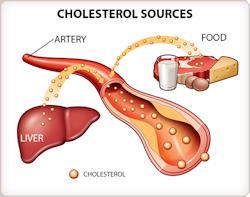Cholesterol as Heart Disease Risk Factor
Protective Cholesterol?
 If HDL-Cholesterol is protective, we can call it "good cholesterol." HDL-Cholesterol is returning to the liver.
If HDL-Cholesterol is protective, we can call it "good cholesterol." HDL-Cholesterol is returning to the liver.
Hence, LDL-Cholesterol is assumed to be "bad" and almost everyone is prescribed a statin to reduce their CVD risk. However, LDL-Cholesterol is travelling from the liver to body tissues and the brain. LDL-Cholesterol does important work, so your body produces it when it's needed.
It's now well known that any effort to reduce cholesterol levels by diet cannot succeed. Your body produces it's own cholesterol independent of your diet.
The link between LDL-Cholesterol and CVD is tenuous. Both the Lyon Heart Study and the ![]() Women's Health Initiative show no effect of LDL-Cholesterol on CVD.
Women's Health Initiative show no effect of LDL-Cholesterol on CVD.
If there is any risk at all in LDL-Cholesterol, it arises from small dense particles it can carry. Hence, the presumed link between LDC-Cholesterol and CVD is being questioned. It may be more smoke than fire.
Framingham Study
Tavia Gordon: One-time director of the Framingham Heart Study reported:
"No relationship could be discerned within the study between food intake and serum cholesterol level."
Therefore, avoiding eating eggs, for instance, was ineffective in reducing total cholesterol in the blood.
The Framingham study showed that total cholesterol isn't a good marker of CVD.
Cholesterol is Abundant in Cell Membranes.
Cholesterol is found in every cell of your body. It is especially abundant in the membranes of these cells, where it helps maintain the integrity of these membranes, and plays a role in facilitating cell signaling-- meaning the ability of your cells to communicate with each other so you function as a human, rather than a pile of cells.
![]() The Framingham study confounded researchers by showing that cholesterol is protective, and that people with higher cholesterol live longer. For 30 years, they were sure of the opposite.
The Framingham study confounded researchers by showing that cholesterol is protective, and that people with higher cholesterol live longer. For 30 years, they were sure of the opposite.
The Best Diet
It makes a lot of sense to say that the best diet is "everything in moderation." And perhaps if we applied that in our lives, the lifestyle diseases that we get wouldn't happen.
There is now a great deal of scientific evidence supporting a ketogenic diet, sometimes called ![]() the Banting Diet. On a
the Banting Diet. On a ![]() ketogenic diet, ALL the symptoms of metabolic syndrome improve. In addition, there may be other health benefits in the reduction of cancers and
ketogenic diet, ALL the symptoms of metabolic syndrome improve. In addition, there may be other health benefits in the reduction of cancers and ![]() Alzheimer's disease.
Alzheimer's disease.
There is a longer discussion on ![]() the best weight loss diet here.
the best weight loss diet here.
Lipoproteins
Lipoproteins a spherical particles, partly fat and partly protein, that are bounded by a water soluble membrane surface. That allows the particles to circulate in the blood.
Lipoproteins include, LDC-Cholesterol. HDL-Cholesterol, triglycerides and phosphollipods.
![]() On a Banting Diet, triglycerides usually drop, there are fewer small dense LDL-C particles, HDL-C increases a lot, blood pressure reduces, and insulin sensitivity improves.
On a Banting Diet, triglycerides usually drop, there are fewer small dense LDL-C particles, HDL-C increases a lot, blood pressure reduces, and insulin sensitivity improves.
In addition, one's weight returns to normal.
